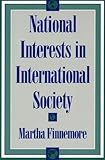National Interests in International Society / Martha Finnemore.
Material type: TextSeries: Cornell Studies in Political EconomyPublisher: Ithaca, NY : Cornell University Press, [1996]Copyright date: ©1996Description: 1 online resource (176 p.) : 4 charts/graphs, 4 tablesContent type:
TextSeries: Cornell Studies in Political EconomyPublisher: Ithaca, NY : Cornell University Press, [1996]Copyright date: ©1996Description: 1 online resource (176 p.) : 4 charts/graphs, 4 tablesContent type: - 9781501707384
- International relations -- Political aspects
- Public interest
- International Studies
- Political Science & Political History
- POLITICAL SCIENCE / International Relations / General
- State society relations, social relations and politics, geneva convention, alexander wendt, relief societies, international relations theory
- 327.1/01
- JX1395
- online - DeGruyter
| Item type | Current library | Call number | URL | Status | Notes | Barcode | |
|---|---|---|---|---|---|---|---|
 eBook
eBook
|
Biblioteca "Angelicum" Pont. Univ. S.Tommaso d'Aquino Nuvola online | online - DeGruyter (Browse shelf(Opens below)) | Online access | Not for loan (Accesso limitato) | Accesso per gli utenti autorizzati / Access for authorized users | (dgr)9781501707384 |
Browsing Biblioteca "Angelicum" Pont. Univ. S.Tommaso d'Aquino shelves, Shelving location: Nuvola online Close shelf browser (Hides shelf browser)

|

|

|

|

|

|

|
||
| online - DeGruyter Rethinking the World : Great Power Strategies and International Order / | online - DeGruyter Path of Empire : Panama and the California Gold Rush / | online - DeGruyter Regime Shift : Comparative Dynamics of the Japanese Political Economy / | online - DeGruyter National Interests in International Society / | online - DeGruyter Talking about Machines : An Ethnography of a Modern Job / | online - DeGruyter Condensed Capitalism : Campbell Soup and the Pursuit of Cheap Production in the Twentieth Century / | online - DeGruyter Public Workers : Government Employee Unions, the Law, and the State, 1900–1962 / |
Frontmatter -- Contents -- Preface -- l. Defining State Interests -- 2. Norms and State Structure: UNESCO and the Creation of State Science Bureaucracies -- 3. Norms and War: The International Red Cross and the Geneva Conventions -- 4. Norms and Development: The World Bank and Poverty -- 5. Politics in International Society -- Index
restricted access online access with authorization star
http://purl.org/coar/access_right/c_16ec
How do states know what they want? Asking how interests are defined and how changes in them are accommodated, Martha Finnemore shows the fruitfulness of a constructivist approach to international politics. She draws on insights from sociological institutionalism to develop a systemic approach to state interests and state behavior by investigating an international structure not of power but of meaning and social value. An understanding of what states want, she argues, requires insight into the international social structure of which they are a part. States are embedded in dense networks of transnational and international social relations that shape their perceptions and their preferences in consistent ways. Finnemore focuses on international organizations as one important component of social structure and investigates the ways in which they redefine state preferences. She details three examples in different issue areas. In state structure, she discusses UNESCO and the changing international organization of science. In security, she analyzes the role of the Red Cross and the acceptance of the Geneva Convention rules of war. Finally, she focuses on the World Bank and explores the changing definitions of development in the Third World. Each case shows how international organizations socialize states to accept new political goals and new social values in ways that have lasting impact on the conduct of war, the workings of the international political economy, and the structure of states themselves.
Mode of access: Internet via World Wide Web.
In English.
Description based on online resource; title from PDF title page (publisher's Web site, viewed 02. Mrz 2022)


